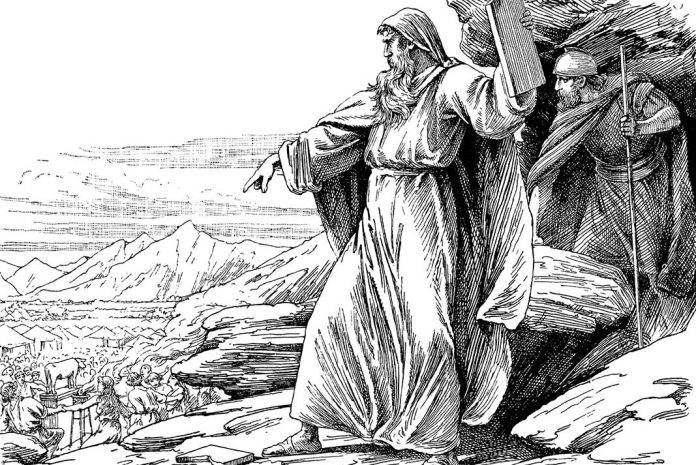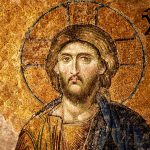The Old Testament is filled with prophecy of a coming Messiah, much of it misunderstood by the Jew since the fullness of its understanding is seen through the lens of the New Testament. Maybe the greatest example of this misunderstanding relates to Isaiah 53. Until the Jew sees Jesus as the object of this chapter, he continues living under a veil (2 Corinthians 3:14-16). The typical Jew of 2021 expects Messiah to be a coming king, taking charge of government and establishing His kingdom. Yet many prophesies of Messiah refer to Him as a suffering servant, particularly through Isaiah. Some Jews expect two different Messiahs, one like David (to be fulfilled in the Kingdom age) and another like Joseph, one who will be rejected.
Some verses or passages speak of both comings, including Isaiah 61:1-2, partially quoted by Jesus Himself in Luke 4:18-19. He was telling the Jews of Nazareth that He was fulfilling His first coming in their midst (“Today this Scripture has been fulfilled in your hearing”), but they did not accept Him at His word, and instead, they tried to kill Him. In Isaiah 61:1, “The Spirit of the Lord God is upon me, because the Lord has anointed me to bring good news to the afflicted”. He purposely left off the reference to His second coming in verse 2, “the day of vengeance of our God”. Jesus Christ was telling them that He would be the Lord’s anointed in both appearances, with the full authority of His Father to complete His work as the ordained Messiah and mediator of the new covenant. Scripture does not clearly spell out the conditions of the new covenant in the church age, but there are two passages in particular that can give us some real definition.
Grace is our instructor
In Titus 2:11-14, Paul speaks of both comings of Messiah beginning in verse 11, “For the grace of God has appeared, bringing salvation to all men”. When Jesus came to earth 2,000 years ago, He brought the grace of God with Him, it was part of His nature. In John 1:14, “And the Word became flesh, and dwelt among us, and we saw His glory, glory as of the only begotten from the Father, full of grace and truth.” This grace, manifested in His glory, defines the new covenant age of the church. Salvation is always a work of God and not men and must be a free gift (Ephesians 2:8-9).
In Titus 2:13, we are encouraged to look forward to “the blessed hope and the appearing of the glory of our great God and Savior, Christ Jesus”, His second coming. In the meantime, Paul writes in verse 12: “instructing us to deny ungodliness and worldly desires and to live sensibly, righteously and godly in the present age”. It is the grace of God and not the Law that is the new covenant believer’s instructor or trainer and this instruction points him directly to Calvary’s cross, where he learns that the godly life is the by-product of self-denial and taking up his cross each day (Luke 9:23). In Luke 9:24, “For whoever wishes to save his life will lose it, but whoever loses his life for My sake, he is the one who will save it”. It is the work of His cross that redeems the believer from every lawless deed (Titus 2:14) and allows him to be saved by Christ’s life.
Mount Sinai
When you examine the delivering of the Law of Moses from Mount Sinai by Moses to the Jews, you will notice that in Exodus 32, Moses smashed the two tablets of stone upon viewing the people, led by Aaron, worshiping the golden calf. It was not until Exodus 34 that Moses was called back to Sinai to receive the tablets again, which he did. What these events symbolize are the two comings of Messiah, the first one characterizing that Jesus would be rejected by the Jews, “He came to His own, and those who were His own did not receive Him” (John 1:11). Between the two comings is considered the church age; between chapters 32 and 34 is chapter 33 and it gives a glimpse into the nature and dynamics of this period as defined by the grace of God.
Thus, the Lord used to speak to Moses face to face, just as a man speaks to his friend. When Moses returned to the camp, his servant Joshua, the son of Nun, a young man, would not depart from the tent. Then Moses said to the Lord, “See, You say to me, ‘Bring up this people!’ But You Yourself have not let me know whom You will send with me. Moreover, You have said, ‘I have known you by name, and you have also found favor in My sight.’ “Now therefore, I pray You, if I have found favor in Your sight, let me know Your ways that I may know You, so that I may find favor in Your sight. Consider too, that this nation is Your people.” And He said, “My presence shall go with you, and I will give you rest.” Then he said to Him, ‘If Your presence does not go with us, do not lead us up from here. “For how then can it be known that I have found favor in Your sight, I and Your people? Is it not by Your going with us, so that we, I and Your people, may be distinguished from all the other people who are upon the face of the earth?” The Lord said to Moses, “I will also do this thing of which you have spoken; for you have found favor in My sight and I have known you by name.” Then Moses said, “I pray You, show me Your glory!” And He said, “I Myself will make all My goodness pass before you and will proclaim the name of the Lord before you; and I will be gracious to whom I will be gracious and will show compassion on whom I will show compassion.” But He said, “You cannot see My face, for no man can see Me and live!’ Then the Lord said, “Behold, there is a place by Me, and you shall stand there on the rock; and it will come about, while My glory is passing by, that I will put you in the cleft [crevice] of the rock and cover you with My hand until I have passed by.” (Exodus 33:11-22)
“My presence shall go with you”
Having acknowledged that the Jews were a stubborn, rebellious people (verse 3), God was threatening to send an angel instead of Himself to lead the people into the promised land against natives occupying the land, but later relinquished and instead He promised Moses that “My presence shall go with you and I will give you rest”. In this conversation, Moses acknowledges that His relationship with the Lord is unique, special, “face to face, just as man speaks to his friend” (see also Numbers 12:8), most likely due to the fact that “Moses was very humble, more than any man who was on the face of the earth” (Numbers 12:3). Just as Jesus humbled Himself to be obedient, even to death on a cross (Philippians 2:8), Moses needed to be humbled to be the mediator of the old covenant.
Moses recognized the grace of God on his behalf as he acknowledged the favor of the Lord and asked Him “let me know Your ways that I may know You” (verse 13). The Apostle Paul understood that the only avenue to truly know God was to recognize that his natural strengths, gifts and accomplishments were of no value “in view of the surpassing value of knowing Christ Jesus my Lord, for whom I have suffered the loss of all things and count them but rubbish so that I may gain Christ” (Philippians 3:8). Paul was referring to the cross as the means of going beyond the limitations of self in order to find an experiential knowledge of God. Moses had spent forty years in the wilderness until he would be ready to lead the people as he was being led by God and he was now counting on God’s grace to lead them.
God’s glory to be seen
Moses also asked that the Lord would “show me Your glory” and His answer was that all the Lord’s goodness would pass before him, revealing his grace and compassion. Before raising Lazarus in John 11, Jesus said to Martha, “Did I not say to you that if you believe, you will see the glory of God?” He was identifying that His miracles were a manifestation of God’s glory, revealing His grace and mercy to multitudes and faith would be the vantage point by which believers would see. Paul wrote about this glory in 2 Corinthians 4:6 when he wrote, For God, who said, “Light shall shine out of darkness,” is the One who has shone in our hearts to give the Light of the knowledge of the glory of God in the face of Christ. The Messiah’s first coming would reveal God’s glory and define the entire church age through His face, His presence. In Jesus’s prayer to His Father in John 17, He would give the glory He had been given to His disciples, “that they may be one, just as we are one” (verse 22).
The Apostle Paul uses the term “in Him” or “in Christ” more than 100 times in his letters to define the new covenant relationship believers have with God through Jesus Christ. It is the place where he is made perfect in his position as a child of God and an identity into which he grows. In Exodus 33:21-22 above, the Lord identifies it as “a place by Me” and “I will put you in the cleft of the rock”. The cleft speaks of a crevice in a rock, large enough for people to hide in or take shelter in and the rock is a clear reference to Christ (1 Corinthians 10:4). “In Christ” is our place of shelter, sealed in Him with the Holy Spirit of promise (Ephesians 1:13). “In Christ”, on the other side of the cross, affords the believer not only protection, but also a perfect position where true intimacy with God through Christ is realized.
Conclusion
Although the church age was not clearly seen by the Old Testament saints, it was always intended by God and revealed within the Scripture writings to those who would desire to truly know the Father, only possible through the Son, the Messiah. Knowing God in this way cannot happen through a religious expression, but will only take place through an intimacy, a spiritual relationship with Jesus Christ (“the king has brought me into his chamber” – Song 1:4). In 2 Corinthians 3:17-18, Now the Lord is the Spirit, and where the Spirit of the Lord is, there is liberty. But we all, with unveiled face, beholding as in a mirror the glory of the Lord, are being transformed into the same image from glory to glory [ever-increasing glory], just as from the Lord, the Spirit. Beholding the Messiah’s glory in the details of life produces a transformation in ever-increasing measure so that the believer can more clearly reflect His glory.













